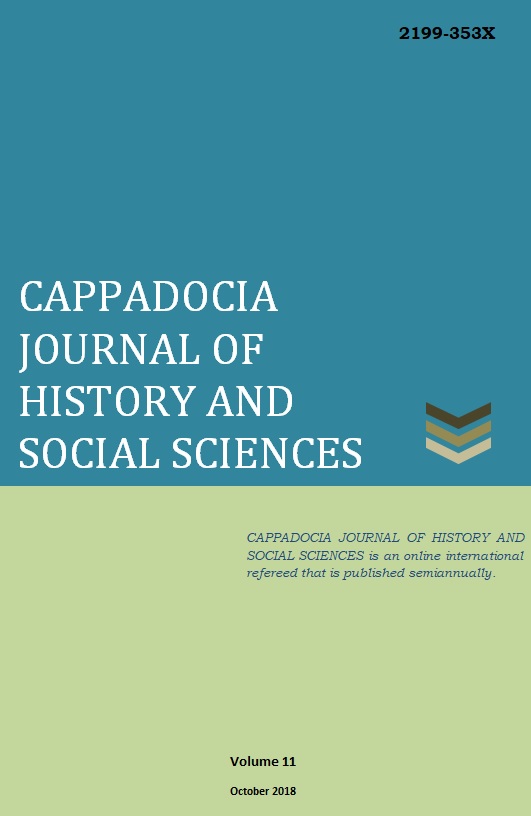ANNALES TARİHÇİLERİ ARASINDA YENİ EĞİLİMLER: ANNALES HAREKETİNİN ÜÇ EVRESİ ÜZERİNE BİR DEĞERLENDİRME
Author :
Abstract
1929 yılında iki Fransız tarihçi Lucien Febvre ve Marc Bloch tarafından kurulan Annales Okulu tarihyazımına yeni bir anlayış getirmiştir. Genel olarak devletlerarası ilişkiler, savaşlar, önemli devlet adamlarının hayatları üzerine yoğunlaşan tarihyazımını kabul etmeyen Annales ekolü, ekonomik ve toplumsal konulara önem ve öncelik veren bir tarih anlayışını gerekli görmüştür. Marksist tarih anlayışından farklı olarak Annales hareketi sadece ekonomi temelli bir bakış açısına sahip olmamıştır. Tarihi bir konu incelenirken sosyoloji, antropoloji, coğrafya gibi diğer disiplinlerden yararlanılması savunulmuştur. Annales ekolünden gelen tarihçiler temelde bu düşünceler etrafında birleşseler de zamanla farklı yaklaşımlar meydana gelmiştir. Genel olarak Annales hareketi üç evreye ayrılmaktadır. Lucien Febvre ve Marc Bloch’un etkin olduğu ilk evre İkinci Dünya Savaşı’nın sonlarına kadar sürmüştür. Bu dönemde geleneksel tarih anlayışına yönelik güçlü bir karşı duruş vardır. Fernand Braudel’un etkin olduğu ikinci evre 1960’ların sonuna kadar sürmüş daha sonra gelen üçüncü evre de ise tek bir kişinin egemenliği söz konusu olmamıştır. Bu dönemde Annales Okulu tarihçileri düşünsel farklılık içinde olmuşlardır. Bu çalışma, Annales Okulu’nun geçirdiği gelişimi ve Annales hareketinin üç evresinde, tarihçilerin yaklaşımlarını incelemektedir.
Keywords
Abstract
The Annales School, founded in 1929 by two French historians, Lucien Febvre and Marc Bloch, has brought a new approach to the conception of writing history. The Annales School did not accept the historiography which focused on relations between the countries, wars and the lives of important political and military personalities. The Annales School defended a conception of history that gave importance and priority to economic and social issues. Unlike the Marxist concept of history, the Annales movement did not only have an economy-based perspective. When analysing a historical subject, it was advocated to use other disciplines such as sociology, anthropology, geography. The Annales historians applied this new method in their works. However, different approaches have emerged among them. In general, the Annales movement is divided into three phases. The first phase, in which Lucien Febvre and Marc Bloch were active, lasted until the end of the Second World War. In this period there is a strong opposition to the tradition of political history. The second phase, in which Fernand Braudel was the leading historian, lasted until the end of the 1960s. In the third phase, no single trend was dominant. The Annales historians started to use different methods. This study examines the approaches of the Annales historians in the three phases of the Annales movement.
Keywords
- Ayan, E. (2011). “Türk Tarihyazımının Evriminde Annales Kuramının Yorumu.” Tarih Okulu, Sayı: XI Eylül-Aralık: 75-101.
- Burke, P. (1990). The French Historical Revolution: The Annales School, 1929-1989. Cambridge: Polity Press.
- Forster, R. (1978). “Achievements of the Annales School.” The Journal of Economic History, Vol. 38, No. 1, The Tasks of Economic History March: 58-76. https://www.jstor.org/stable/2119315?seq=1#page_scan_tab_contents (2 Nisan 2018).
- Green, A., Troup, K. (1999). The Houses of History: A Critical Reader in Twentieth-Century History and Theory. Manchester: Manchester University Press.
- Harsgor, M. (1978). “Total History: The Annales School.” Journal of Contemporary History, Vol. 13, No. 1 January: 1-13. https://www.jstor.org/stable/260089?seq=1#page_scan_tab_contents (25 Mart 2018).
- Hunt, L. (1986). “French History in the Last Twenty Years: the Rise and Fall of the Annales Paradigm.” Journal of Contemporary history, Vol. 21, No. 2, Twentieth Anniversary Issue, April: 209-224.
- İnalcık, H. (1978). “Impact of the Annales School on Ottoman Studies and New Findings.” Review, Vol. 1, No. 3/4, The Impact of the “Annales” School on the Social Sciences Winter - Spring, 1978: 69-99.
- Kedourie, E. (1984). “HISTORIOGRAPHY: History, the Past and the Future.” The American Scholar, Vol. 53, No. 1, Winter: 109-115.
- Olabarri, I. (1995). “"New" New History: A Longue Duree Structure.”, History and Theory, Vol. 34, No. 1, February: 1-29.
- Revel, J., Hunt, L. (eds.). (1995). Histories: French Constructions of the Past . New York: New Press.
- “The "Annales Movement" and Its Historiography: A Selective Bibliography.” (1993). (Compiled by JeanPierre V.M. Herubel), French Historical Studies, Vol. 18, No. 1, Spring: 346-355.





